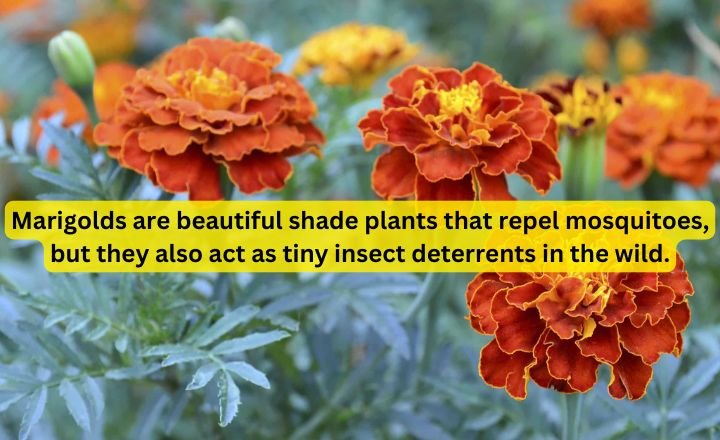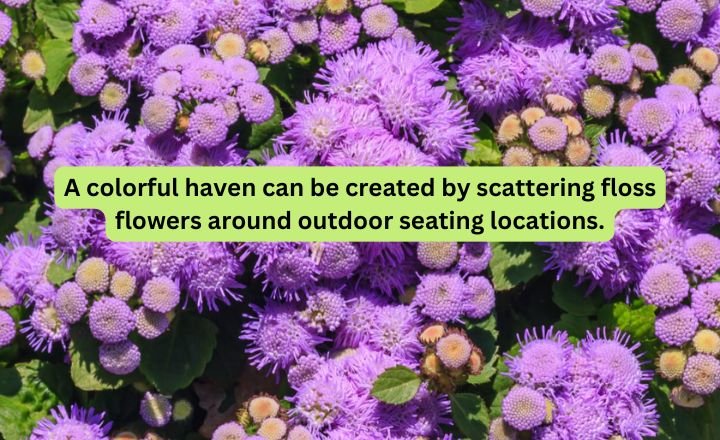Plants that repel insects make your yard more visually appealing and they also foster a peaceful living space where comfort and nature coexist that is why they are called the Mosquito Repellent Plants. Let’s take citronella mosquito repellent plant grass, which is widely recognized for keeping mosquitoes away by disguising the scent of human skin with a cool, citrus aroma.
This hardy plant is not only useful but also offers a beautiful border to outdoor areas and lots of lush greens. These happy flowers not only improve spirits but also draw useful insects that help maintain a healthy environment in your garden.
A List of Mosquito Repelling Plants Is as Follows:
Lavender
| Plant type | Perennial |
| Zones | 5-11, depending on type |
| Bloom time | Summer to fall |
The alluring aroma of lavender not only pleases our senses but also acts as a natural pest repellent for a variety of pests. Because of the concentrated concentration of aromatic essential oils in its leaves, most herbivores and bothersome insects avoid it, even if butterflies and bees may swarm to its bloom.
It’s interesting to note that research indicates lavender oil may disorient mosquitoes by interfering with their sense of smell, preventing those annoying biters from bothering us as we spend calm nights outside. It’s also a garden symbol of persistence. All this hardy perennial needs to flourish is full sun and well-drained soil, making it a true low-maintenance garden staple.
Marigold
| Plant type | Annual |
| Bloom time | Late spring until frost |
Marigolds are beautiful shade plants that repel mosquitoes, but they also act as tiny insect deterrents in the wild. Their distinct aroma works wonders as a repellent, particularly against mosquitoes, which makes them a great option for outdoor areas.
Pots of marigolds placed in strategic locations near patios or doorways can let you enjoy your summer evenings without worrying about invading bugs buzzing around. This fragrant flower makes the space more comfortable by acting as a natural barrier and adding color.

Citronella Grass (Lemon Grass)
| Plant type | Usually grown as an annual |
| Zones | 9-11 |
Fresh citronella leaves emit a pleasant yet powerful odor that deters unwanted pests, in contrast to synthetic repellents that may include harsh chemicals. This fragrant plant is a favorite of the Brooklyn Botanic Garden since it is both a beautiful addition to outdoor spaces and an environmentally friendly solution.
When the plant is alive and prospering, its aromatic oils are at their peak, which has the double benefit of making your yard look beautiful and providing a relaxing atmosphere. Along with the bee balm the lemon balm plant mosquito repellent is also well known.
Catmint
| Plant type | Perennial |
| Zones | 3-8 |
| Bloom time | Early summer to fall |
Frequently confused with its playful relative, catnip, mint has several health advantages that go well beyond its enticing scent and pretty flowers. Being a member of the mint family, it thrives in a variety of climates and soil types with amazing tenacity, which makes it a great option for both gardeners and nature lovers. Once catmint is established, it can spread quickly throughout your garden beds and borders because of its tenaciousness, which verges on boisterousness.

Rosemary
| Plant type | Perennial herb |
| Zones | 7-10 |
Carrot flies, cabbage moths, and bothersome mosquitoes are all natural enemies of rosemary. It is a great option for gardeners who want to enjoy their outdoor spaces without having to constantly deal with insects because of its strong woodsy scent, which serves as a potent deterrent to these unwanted guests.
It’s interesting how adaptable it is, allowing for innovative gardening solutions. Pruned rosemary may take on a variety of sizes and forms, which not only adds visual appeal but also functions as a pest deterrent.
Basil
| Plant type | Usually grown as an annual |
| Zones | 10-11 |
| Bloom time | Summer to frost |
Basil leaves have a strong, fragrant perfume that efficiently keeps flies and mosquitoes away, making it a great companion plant for other floral plants. As you experiment with different types of basil, including Sweet Basil, Thai Basil, or even Purple Basil, you’ll discover distinct fragrances and flavors that enhance the quality of your food and promote the well-being of the ecosystem in your garden.

Citronella / Scented Geranium
| Plant type | Usually grown as an annual |
| Zones | 10-11 |
| Bloom time | Spring to fall |
Geraniums with scents, especially those with a lemon aroma, are useful additions to your garden in addition to being a visual delight. They naturally repel bothersome mosquitoes and other undesired pests with their perfume, which is reminiscent of citronella grass. This is the wonder of adding these colorful plants to your outdoor space imagine spending an evening outside without having to keep swatting insects away.
Bee Balm
| Plant type | Perennial |
| Zones | 4-8 |
| Bloom time | Mid to late summer |
Bee balm is a natural insect repellent as well as a beacon for helpful pollinators, thanks to its vivid colors and wonderful scent. Crushed leaves exude fragrant aromas that deter and confound pests, making it a great option for organic gardens trying to preserve biodiversity without using harsh chemicals.

Mint
| Plant type | Perennial herb |
| Zones | 3-8 |
Mint is an excellent all-natural bug deterrent. It is an indispensable companion for outdoor living because of its powerful scent, which drives away flies, mosquitoes, and even ants. Put some potted mint on your patio; these bright green plants will go well with your outdoor furnishings and be easily accessible for both utilitarian and decorative purposes.
Floss Flower (Ageratum)
| Plant type | Usually grown as an annual |
| Zones | 9-10 |
| Bloom time | Planting to hard frost |
With its vivid and fluffy blossoms, floss flower gives garden aficionados not only a visual treat but also an intriguing twofold benefit in terms of insect control. This annual beauty adds color and acts as a natural mosquito repellant. It grows well in both beds and containers. A colorful haven can be created by scattering floss flowers around outdoor seating locations.

Sage
| Plant type | Perennial |
| Zones | 5-8 |
Planting sage close by will enhance the appearance of your outdoor area and provide an odor-blocking barrier to keep intruders out. When you toss fresh sage onto the flames, its earthy aroma fills the air, drawing insects away so you may enjoy every moment undisturbed.
Allium
| Plant type | Bulb |
| Zones | 3-8, depending on variety |
| Bloom time | Planting to hard frost |
Allium bulbs become eye-catching decorative accents as well as organic pest deterrents. Their wacky globe-shaped flowers, placed atop thin stalks, produce a breathtaking show that sways with the wind and lends elegance to any setting. These bulbous beauties are not only aesthetically pleasing, but also belong to a family of plants, which also includes garlic and onions, that are recognized for their potent insect-repelling scents.
More Natural Ways to Keep Mosquitoes Away
You’ll appreciate your outdoor space more and support a healthy ecology when you incorporate mosquito control into your gardening practice. Mosquito breeding grounds can be significantly decreased by taking proactive steps to remove standing water. Being aware of places where moisture collects can greatly aid in preventing bug infestations, since even a few droplets can serve as a breeding ground for these pests.
Organic gardening concepts perfectly mesh with natural solutions such as mosquito rings, which offer an environmentally beneficial approach. These rings don’t affect other creatures; instead, they release advantageous bacteria that selectively target mosquito larvae.
The Importance of Mosquito Control
A startling reminder of mosquitoes’ significance on world health is their position as disease carriers. These little but dangerous insects have not only invaded our personal space by biting and buzzing, but they have also had a big impact on the spread of disease throughout continents. Diseases like dengue and Zika are on the rise again, and they are quickly moving from tropical to temperate regions as a result of climate change.
Final Words
Adding Mosquito Repellent Plants to your garden or outdoor areas not only improves the visual attractiveness but also fulfills a useful function of keeping unwanted insects away. These plants, which range from the colorful marigold to the fragrant lavender, provide all-natural remedies that are less harmful to people and animals than chemical repellents.
Many of these plants that repel mosquitoes are also easily grown in pots, so even people with small gardens can benefit from them. Accept the usefulness and beauty of mosquito-repelling plants; begin collecting them now to enjoy a summer free of insect bites. The best plants to repel mosquitoes include citronella, lavender, marigolds, basil, and peppermint.
FAQs
What plant repels mosquitoes?
Citronella, lavender, marigolds, basil, and lemon balm are popular plants known for their mosquito-repelling properties.
What is a mosquito repellent plant?
A mosquito repellent plant is a type of flora that naturally deters mosquitoes due to its scent or chemical properties.
Which lavender species plant repels mosquitoes?
The English lavender (Lavandula angustifolia) is considered the most effective due to its high oil content.
What are the indoor plants that repel mosquitoes?
Some of the most effective indoor plants include citronella, lavender, marigold, and basil. These plants naturally emit scents that deter mosquitoes.